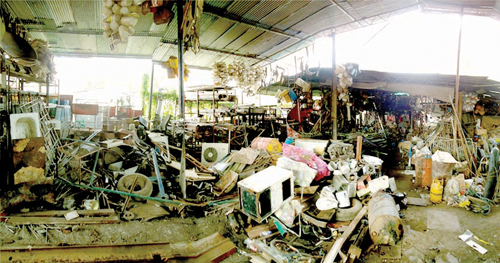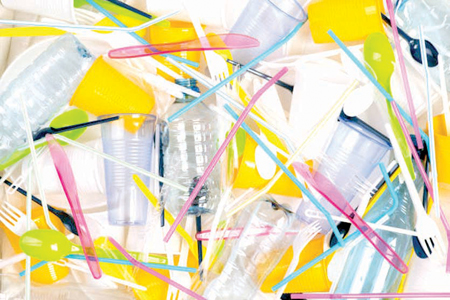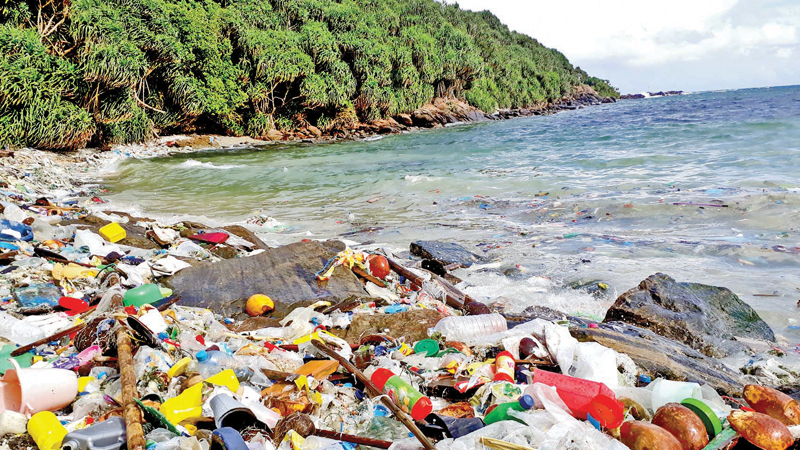“Continue to contaminate your bed, and you will one night suffocate in your own waste.” –Native American Chief Seattle in 1855
 Pushing carts through neighbourhoods, knocking on gates, or quietly sifting through piles of waste, hot under the sun or soaked by the rain, they go unnoticed by most of us. Yet, informal waste collectors, who make a living out of what the rest of us throw away, be it empty bottles, broken chairs, or discarded containers from homes, schools, and offices, play an important role in managing our plastic mess.
Pushing carts through neighbourhoods, knocking on gates, or quietly sifting through piles of waste, hot under the sun or soaked by the rain, they go unnoticed by most of us. Yet, informal waste collectors, who make a living out of what the rest of us throw away, be it empty bottles, broken chairs, or discarded containers from homes, schools, and offices, play an important role in managing our plastic mess.
Small recycling businesses and door-to-door collectors separate what is valuable and sell it to junk shops, where it is cleaned and processed into chips, flakes, or granules, eventually finding their way into local recycling plants or overseas markets like China and India. Whatever recycling truly works in the country often begins in the hands of these informal workers, of course, in addition to our hard working municipal workers.
As we observe “World Environment Day 2025,” which calls for collective action to tackle plastic pollution, these individuals, who quietly carry the weight of our plastic waste problem, deserve recognition. In their own small but significant ways, they have kept thousands of tonnes of plastic off our roads and out of our waterways, turning trash into a livelihood.
Yet, low-value, hard-to-recycle plastics such as grocery bags, food wrappers, and contaminated packaging are left behind. These are the plastics that clog our drains, burn in open pits, and pollute our environment.
“It is only one straw,” said 8 billion people. “Just one plastic bag”, “just one bottle”, “just one wrapper”, and the list goes on. Global plastic waste generation has said to be grown more than seven-fold in the past four decades to 360 million metric tons per year. Forty percent of it accounts for single-use products. More disturbingly, 91 percent of plastic waste globally remains unrecycled. Most of it ends up in landfills or the ocean. Global plastic waste is projected to almost triple by 2060.
Plastic burden
The Earth is drowning in plastic, and so are we. Micro plastics are now in our lungs, bloodstreams, and even breast milk. Ironically, the very material designed to simplify our lives is now harming our planet, our health, and our economies.

Door-to-door collectors separate what is valuable and sell it to junk shops
Estimates suggest that Sri Lanka generates over 260,000 tonnes of plastic waste annually, leading to nearly 12 kg per capita per year, according to a 2024 report titled “Plastic policies in Sri Lanka” by SWTCH-Asia Program.
“In Sri Lanka, 89 percent of the annual amount of plastic waste (more than 232,000 tonnes) is mismanaged. The annual per capita ratio of mismanaged plastic waste stands at 10.5 kg, which is roughly 2 kg lower than the global average of 12.5 kg. By far the largest share of mismanaged plastic waste is burned in open sites. Most of the collected plastic waste is discarded in open dumps. The recycling rate in the province that contributes most to plastic waste stands at 3 percent,” the Report says.
According to ‘National Plastic Waste Inventory for Sri Lanka: A Material Flow Approach’ published by the Environment Ministry in February 2024, the informal waste recycling sector is estimated to collect 65,383 tonnes of source-segregated plastic waste, as well as an estimated 10,416 tonnes of plastic waste as part of mixed waste collections. In comparison, formal recycling services run by local authorities handle much less.
“An estimated 67,965 tonnes per year (27 percent) of plastic waste is not collected at all. Instead, these materials are typically burnt, dumped, or buried on site. A further 101,450 tonnes (41 percent) of plastic waste are estimated to leak from the waste management system during collection, transporting, sorting, and landfilling,” the Report adds.
It is in this context that we mark “World Environment Day 2025’ with a focus on ending plastic pollution. Declaring a ‘National Environment Week’ from May 30 to June 5, the Environment Ministry has geared up its conservation, restoration and pollution prevention efforts.
Circular Economy
Environmental authorities have been promoting the concept of a ‘Circular Economy’, an economy where the value of products, materials, and resources is maintained for as long as possible and waste generation is minimised, as a way forward. As the State cannot foot the bill alone, public-private collaborations are encouraged. However, because recycling is not yet fully understood or embraced as a business opportunity, the private sector has at times been hesitant to fully commit.
Apparently, there is no specific law in Sri Lanka that makes the top plastic polluters bound by the policy of ‘Extended Producer Responsibility’ (Responsibility of a producer for the environmentally sound management of the product until the end of its life). Authorities have repeatedly stressed the need to implement the ‘Polluter Pays Principle’ to effectively tackle the plastic pollution crisis.
The Government banned plastic bags less than 20 microns in thickness in 2018 and several single-use plastic items like drinking straws, cups, plates, cutlery, plastic garlands and plastic string hopper trays in 2023. However, these items are still commonly seen in the market, casting doubt on the effectiveness of the bans.
The Central Environmental Authority (CEA) has conducted raids to nab those importing, manufacturing, distributing and selling banned plastic items, but the lack of high-quality, environmentally sound alternatives at affordable prices has made the bans difficult to enforce, and has failed to trigger a meaningful shift in consumer behaviour.

Single-use plastic items
Central Environmental Authority Director General Padmasiri Moonamale, while acknowledging that implementation of the ban remains weak, however, stressed that the law means little without the backing of the people.
“People should make a conscious decision to avoid single-use plastics, not just because the law says so, but because they understand the consequences. The dangers of microplastics to our health have been scientifically established, but people are less aware of it. If they knew, they would behave differently,” he said.
Raising campaigns
The Director General said awareness raising campaigns on plastic pollution would be ramped up parallel to the Environment Day program. Responding to a question by a journalist at a press conference on Wednesday at the Government Information Department, he admitted that organised networks, engaged in the illegal manufacture, distribution, and sale of banned plastic items, continue to operate under the radar. He added that the CEA would crack them down as firmly as possible.
This year’s World Environment Day comes just two months ahead of the next round of negotiations on a United Nations (UN) global treaty to tackle plastic pollution. This treaty aims to cover the entire life cycle of plastic, from how it is made and designed to how it is thrown away. It is also meant to help countries share technology, build skills, and work together on scientific and technical solutions. Such initiatives could help Sri Lanka bridge the financial and technological gaps in addressing its plastic waste crisis in a holistic manner.
About World Environment Day
* World Environment Day, marked annually on June 5, was established by the United Nations General Assembly in 1972.
* Over the past five decades, the Day has grown to be one of the largest global platforms for environmental outreach.
* This year’s theme focuses on solutions to the plastic pollution crisis.
* Sri Lanka marks the occasion with a ‘National Environment Week’ from May 30 to June 5.
– May 30: Plastic waste management day
– May 31: Air pollution mitigation day
– June 1 – Environmental cleanliness awareness day
– June 2 – Biodiversity conservation day
– June 3 – Water and water resources conservation day
– June 4 – Coastal cleanup day
– June 5 – Tree plantation and National Environment Day celebration
* The national ceremony will be held in Kegalle with the participation of President Anura Kumara Dissanayake.




